Harmony, on the surface, seemed to reign during last November's slating session. John Stroger, a 23-year veteran of the County Board, received the backing of the Democratic Central Committee for County Board president. Stroger, however, has no guaranteed victory in the March primary. Two other Democrats have filed — Pucinski and fellow County Board member Maria Pappas. Republicans, likewise, have a contested primary, as Palatine village president Rita Mullins faces Chicago attorney Joe Morris.
"It's a weak field of candidates," comments Windy City Times columnist Jon-Henri Damski. Electorally, at least, all have left something to be desired. Morris has never run for office. Stroger never won an election outside his ward, running as an individual, and he fared poorly in primaries for Congress and state party committeeman. Mullins lost a primary election for state representative. Pucinski lost a statewide primary to a supporter of political extremist Lyndon LaRouche; more significantly,
|
|
Democratic candidates for Cook County Board president
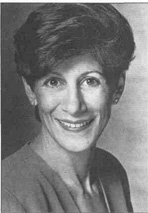
Maria Pappas
|
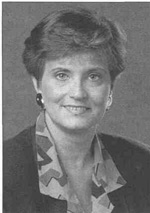
Aurelia Pucinski
|
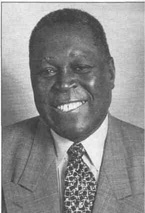
John Stroger
|
|
|
|
she failed to carry her own precinct and ward in a general election. Pappas won only one election, and that was largely due to the luck of a lottery.
Yet these primaries may prove significant to the future of both county parties. For Democrats, a Stroger win may signal the return of the party organization as the chief power broker in county elections, or at least slow its decline for a few more years. A Pucinski victory may bring to county politics the racial split which has plagued Chicago politics. A victory from Pappas could undermine the importance of the party organiza-
|
20/February 1994/Illinois Issues
Republican candidates
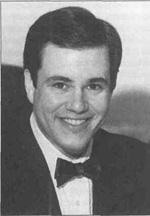
Joe Morris
|
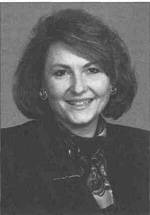
Rita Mullins
|
|
tion in whatever form. For Republicans, the question remains whether the moderate versus conservative schism which has become a part of governor and U.S. Senate primaries in recent years will become institutionalized in Cook County Board president primaries also.
Almost alone among Cook County Democrats, County Board president George Dunne was a calming influence in the party during the 1983-87 Council Wars years. Party regulars respected the man who was a confidant of the late Mayor Richard J. Daley. Independents admired the only major party regular who supported Washington in the 1983 general election. While both regulars and Washington allies supported separate Democratic county slates in 1986, all sides backed Dunne, and he won reelection easily.
|
His term proved fraught with problems. Property taxes and county government costs spiraled. Dunne's stance against abortions at Cook County Hospital gained him the wrath of many Democratic voters. A sex scandal (a rare event in a county where scandals of other kinds are commonplace) also proved embarrassing to the 76-year-old board president.
Nonetheless, his decision in late 1989 not to seek reelection caught many Democrats off guard. County Clerk Stanley Kusper sought the party's nod, but his frequent vocal criticism of the still-popular Dunne hurt him. Chicago Alderman Ed Burke likewise offered himself, but his role as a chief Washington foe during Council Wars made him anathema to black committeemen. Stroger and state Sen. Howard Carroll offered themselves during the public portion of the slating session and found the response underwhelming.
Democratic power brokers finally settled on a candidate for County Board president — Thaddeus "Ted" Lechowicz, a state senator who was highly regarded in Springfield but little-known in Cook County. The rest of the ticket was heavy on present or former committeemen, light on women, Hispanics and independents. Three of the eight slated candidates would lose their elections. Chicago west side committeeman Danny Davis commented, "The last ticket, somebody said, that was made in heaven. I think this one was made in just the opposite place."
Meanwhile, meetings were held at south side Chicago committeeman Allan Streeter's office to come up with an alternative president candidate. There were two main factions. One side, which included former Washington adviser Jacky Grimshaw and west side activist Richard Barnett, promoted white Washington ally David Orr as the most electable candidate. Another group, which included Streeter and other black elected officials, insisted that an African American should be designated. Orr finally stepped aside to run for county clerk, and former judge Eugene Pincham emerged as the consensus choice for president.
One person not seriously considered by any group was Stroger, even though he was County Board Finance Committee chairman. Traditionally, the finance chair succeeded a retiring president. But "John didn't have much going for him other than being Dunne's toady," comments Bruce DuMont, host of Illinois Lawmakers and Inside Politics. Stroger's support for Daley for mayor over black candidates in 1983 and 1989 hurt him in the African-American community. "Stroger's only black when it's advantageous," Barnett charged. When the Democratic Central Committee caucus met to decide on a candidate, Stroger withdrew his name from consideration. "He said he was not ready to run for president," Dunne said.
Slated candidate Lechowicz was never a serious contender for the presidency. Instead, Winnetka attorney Richard Phelan won the nomination and ultimately the general election. Phelan, running as an outsider, nonetheless received the support of several key Daley operatives. He attacked Kusper early, thus effectively making it a Phelan-versus-Pincham race — a primary that Pincham's followers claimed was marked by racially charged remarks from Phelan.
After only one term in office, Phelan decided to run for governor in 1994, leaving the County Board presidency wide open. David Orr was the consensus frontrunner — if he wanted the job. "My support was very strong. Polls showed me beating all challengers," Orr claimed. "Daley would have been 10 thousand percent for Orr for County Board president," Barnett added. "An Orr victory would have eliminated Daley's most formidable 1995 mayoral foe."
Orr declined the race, instead seeking another term as county clerk. Meanwhile, Maria Pappas announced her candidacy as an anti-machine independent in August. Pappas, a one-term commissioner who owed her office in part to her lottery-winning position on top of the ballot during the 1990 primary, was Phelan's major County Board critic on matters such as taxes and patronage.
Stroger formally entered the race a month later. Many black leaders who ignored him four years ago now jumped to his side. Former Chicago 7th Ward committeeman Alice Palmer, who pushed for Orr in 1989, claimed,"Commissioner Stroger is the main can-
February 1994/Illinois Issues/21
|
Cook County president candidates
and their issues: Dems vs. Dems
and GOP vs. GOP
The politics of the Cook County Board president may be the determining factor for many primary voters. But each candidate carries a different set of issues and proposals into the campaign.
On the Republican side, Chicago attorney Joe Morris calls for "a complete overhaul" of the county government, culminating in a county "constitutional convention" that would produce a new Cook County charter to be submitted to the voters for a referendum. Morris seeks legislation to prevent the County Board president from serving simultaneously as a County Board member. He proposes abolishing the elective offices of assessor, county clerk, recorder of deeds and treasurer (making them part of a united executive branch under the president), consolidation of the Metropolitan Water Reclamation District into county government and term limitations. Morris proposes privatization of Cook County Hospital and no new hospital construction, greater metropolitan coordination of law enforcement, incentives for business location in Cook County and an aggressive program of recycling abandoned property into housing and business uses.
His Republican opponent, Palatine village president Rita Mullins, is running on a platform of increased personal safety, cutting government and taxes, and public service. She calls for increased attention to victims' rights, more beat patrolmen, a ban on semiautomatic weapons and trial as adults of youngsters accused of violent crimes. Mullins seeks to privatize many county functions, consolidation of functions (a centralized printing operation, for instance) and curbs on excess spending. She proposes regional county government offices and calls for a more equitable tax formula for the suburbs, increased police protection in unincorporated areas and greater intergovernmental cooperation.
In the Democratic quest for the nomination, Cook County Commissioner Maria Pappas seeks to enact the "truth in budgeting" bill she introduced as a commissioner, which would prohibit county officials or employees from knowingly providing false information about intended or actual use of public funds. She asks for further study and "thoughtful debate" over whether a new Cook County Hospital is needed. Pappas introduced a three-point program to control county waste: formation of a productivity commission, a "savings incentive program" designed to elicit county employees' input on how to save tax dollars and a countywide tollfree hotline for residents to report county waste and fraud.
Democrat and the current Circuit Court Clerk Aurelia Pucinski unveiled a 50-promise manifesto for Cook County government. Among her proposals were a ban on "for profit" activities involving any government agency, a 1,000 percent county tax on bullets and a quarterly report on the status of her campaign promises.
Cook County Commissioner John Stroger as of early January had not announced an official campaign platform in his bid to get the Democratic party nomination. Stroger campaign officials said he would focus on "a variety of issues, featuring crime, health care and fairness."
David Fremon
|
|
didate. He's proven himself to be active on the board. He will be a strong candidate, no matter what."
A month later Pucinski, a protege of Illinois House Speaker Michael J. Madigan, declared her candidacy. Stroger charged that she was breaking a promise not to oppose him for the top Cook County office. He also claimed that hers was a candidacy to prevent a black board president. She responded, "Why isn't his candidacy one to prevent a woman president?" Pucinski also announced results of a commissioned poll which showed her leading all other candidates.
Party slating was never in question. "Stroger got slated because he's been [in the County Board] many years," said Chicago's 33rd Ward committeeman Richard Mell. Pappas refused to appear before the slating committee. Pucinski paid a "courtesy call" at the slating session but pointed out that she was not seeking the party endorsement.
Cook County Republican slating sessions generally have been as open as papal elections and as meaningful as others for dogcatcher. Committeemen gathered to come up with a slate that all but the most optimistic conceded to be sacrificial lambs the following November. The lack of a Democratic incumbent County Board president, however, left the party with hope for the 1994 election. All they needed was a candidate.
Don Haider appeared to be that candidate. A Northwestern University professor, he was a former city budget director and 1987 mayoral candidate. "Had I actively sought the party endorsement, I could have gotten it," he admits. But financial considerations (due to problems of securing a leave of absence for a campaign and lack of adequate funding in his previous mayoral race) plus lack of overriding interest ("I just didn't have the fire in my belly") led him to decline the campaign.
Former Evanston Mayor Joan Barr was approached at the same time as Haider but later was informed that Haider was the party choice. After Haider refused the slating, Barr was approached again but likewise declined.
Rita Mullins, the Palatine village president, was also contacted. Her candidacy posed a problem. If she ran for County Board president, she also planned to seek the commissioner seat in her home district, one drawn for commissioner Richard Siebel. Although former Cook County GOP party chairman Siebel had received criticism from several Republicans, including current county party chairman Manny Hoffman, for voting to approve a district map that appeared to limit probable Republican representation, others hesitated to encourage an intraparty fight over a district seat. (NOTE: Pappas and Stroger are seeking reelection to the board from newly drawn districts as well as running for board president. Pucinski and Morris have declined to run for commissioner seats.)
One Republican was not hesitant to fill the candidate void. Joe Morris, an attorney and former assistant to Clarence Thomas at the Equal Opportunity Employment Commission, promised not to run if Haider entered. With Haider absent, the conservative Morris vowed to stay in the race, with or without formal party blessing.
Republican leaders balked at giving that blessing. Morris and allies, including Chicago's 48th Ward GOP committee-
|
22/February 1994/Illinois Issues
man John McNeal, showed up for the November 6 party convention. Hoffman, however, postponed the convention in order to find another candidate. Republican operatives off the record cited fears by Gov. Jim Edgar that a conservative such as Morris heading the Cook County slate might adversely affect the statewide ticket. Morris backers countered by pointing out the lack of election success of other hopefuls; Barr had lost a recent state representative election, and Mullins had lost a state representative primary.
The convention finally convened November 29. Mullins arrived with sufficient weighted vote support from committeemen, which McNeal claimed came from persuasion or threats from Edgar and others (in his nomination speech, he commented, "Maybe your arms have been twisted so hard that your hearts have been hardened"). Mullins won the endorsement, a hollow victory. Earlier in the meeting, McNeal had successfully introduced an amendment doing away with a rule forcing committeemen to support the party's slated candidates. In effect, Republicans left the meeting with an open primary.
As with Mullins, Stroger's slating assures nothing. Several major white Democratic committeemen, if not openly endorsing Pucinski, have spoken less than critically of her. Madigan, who has members of his organization holding several of the top positions in the circuit court clerk's office, continues his support. Mell backed Pucinski because "I think she's the strongest candidate." County assessor Tom Hynes, leader of the strong Southwest Side 19th Ward organization, gave a brief endorsement to Stroger during the slating session, but not before heaping effusive praise upon the Pucinski family.
Stroger's support is not even unanimous among black committeemen. Jesse Evans, committeeman of Chicago's vote-heavy 21st Ward, gave early support to Pucinski. Ricky Hendon (27th Ward), a leading west side independent, was believed to be leaning toward Pappas. The Harold Washington Party, a black-led group that scored significant totals in some 1990 county elections, also will hold a contested primary for County Board president, although Dunne predicts, 'Their impact will be minimal." Stroger, however, maintains the support of several key white committeemen, including Dunne, John Daley (llth Ward) and county party chairman Tom Lyons (45th Ward). Palmer predicts the slated candidate, Stroger, will prevail. "Most committeemen know that a Stroger victory is too important for the sake of the party," she commented. "It would be tragic were he to lose" to Pucinski.
Despite some crossings of racial lines by party leaders, the campaign has already developed racial overtones. Bobby Rush, the 2nd Ward committeeman, predicted massive black defections from the Democratic ticket in the general election unless an African American is nominated to a prominent office (in addition to Stroger on the Cook County primary ballot, Roland W. Burris is a candidate for the Democratic nomination for governor).
Fears of a racial-based campaign emerged from early remarks which were seen by many to have racial overtones. On a radio program shortly after the slating session, Pucinski inaccurately accused Stroger of attending two meetings of a national gang summit held in Chicago. Pucinski was already viewed with suspicion by many blacks as daughter of former Chicago Alderman Roman Pucinski, who was a member of the anti-Mayor Washington bloc during the Council Wars. Stroger had attended two meetings at which gang leaders were also present. One was an Operation PUSH meeting during the weekend of the summit (Stroger and other black politicians frequently attend the weekly PUSH meetings). The other was a rally of a political action group with street gang ties, which was also attended by other black officeholders. If Pucinski's remarks won votes in the bungalow belt, she might have lost as many from universal criticism from editorials and columnists who accused her of linking blacks and crime. Pucinski at first issued a half apology unacceptable to Stroger: "I regret that some have considered my remarks inappropriate." Only after Stroger threatened not to debate her did she retract the charges linking Stroger with street gangs.
"The No. 1 issue in the Democratic party is race, an issue the party is still trying to grapple with," says Orr. According to conservative consultant and commentator Tom Roeser, the issue of race will not go away, no matter whether Pucinski or Stroger wins. "There will always be an African-American and a white candidate running," he predicts.
The main problem facing the Democratic organization may not be race, but Maria Pappas. She is running as the anti-machine candidate, charging during a radio interview that "Pucinski is a second generation politician and Stroger is a lifelong one" and that a battle between Stroger and Pucinski is less a war of black versus white than a battle over who controls county patronage.
Damski predicted, "Pappas could win, especially if others wrangle over low-level racial disputes." DuMont added, "I think Maria's going to pull a little bit of the white vote, a little bit of the black vote, a little bit of the women's vote, a lot of the gay vote, the 'Throw the rascals out' vote."
While a victory by Pappas might severely undermine the reputation of a party endorsement in a primary election, even a victory by Stroger cannot assure that party slating could remain the invincible weapon it was in previous years. Dunne, a former Cook County party chairman, admits, "You have a different environment and technique of presenting candidates, with television and radio. The organization has lost some value in that regard."
For Republicans, the question may not be whether Joe Morris wins or loses but whether a conservative candidate (Morris or anyone else) will be a fixture in future Republican primaries. "You've had moderate versus conservative tensions in the party for years, but they were generally kept under cover," comments Haider. "Now we have an honest-to-goodness primary, which is not all that bad. There's no reason to believe that primaries won't occur in the future."
"In the foreseeable future, you'll have a conservative challenge in the Republican primary," predicts Roeser. "There's not a split, there's a San Andreas fault in the Republican party."
David Fremon is a free-lance writer in Chicago and a frequent commentator on the Cook County political scene.
February 1994/Illinois Issues/23





